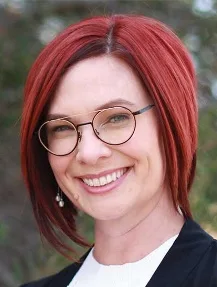
Listening to the Holy Spirit
I’m infamous for a few decisions at the wilderness ministry: taking the instructor staff winter camping in -30 degrees F for five days; doing snow travel training in a blizzard; requiring new instructor staff to identify native trees while camping during a tornado. (In my defense, I didn’t know it was a tornado. Wyoming is normally really windy, and I didn’t want the new staff to think they could hide in their tents when the weather was less than ideal.)
Each of these decisions were not accidents—they were intentional choices. I wanted to stretch the instructors so they could learn they were capable of more while they were still in the safety net of our guidance as senior leaders. I wanted to learn who they were in threatening moments so that I could speak life to them and disciple them then and there. I wanted their hardest challenges to be ones they faced with us, so that they would keep their head and not abdicate their role when they were without us. If I challenged them myself, I hoped they would not be overwhelmed when they faced an emergency or significant situation.
The commitment of the community, combined with the effective teaching and learning techniques, created a space where they could grow and increase their capacity as leaders and as disciplemakers. They learned how to stay present when things got really hard (tests). They discovered what they were good at (strengths). They saw and faced the unredeemed parts of their heart or character (inner weaknesses). And they learned to press into God and hear what Holy Spirit was saying in the middle of everything.
Sometimes when life gets harder and we face trials or increased challenges, we want to retreat and hide or be defensive and fight. But this is not what Jesus calls us to do. Jesus asks us to do something much harder: reach out and hold on to one another. As a disciplemaker, your presence helps the disciple do what they could not do on their own.
How do we follow Jesus deeper into the unknown so we are truly changed? Creating security as we move further into the unknown requires two things: learning to be led by the Spirit of God and learning our own voice.
Listening to Holy Spirit
Being Spirit-led is an essential aspect of what it means to live as a disciple of Jesus and his Kingdom. Just like I needed to teach my instructor staff to be safe without me, we need to teach those we disciple to be able to hear Holy Spirit for themselves as well. And if we are going to reproduce disciples who are dependent on Holy Spirit, then those we are discipling must first see us depending on Holy Spirit for wisdom and revelation.
Listening to the Spirit’s leading is our most unused faith muscle. We must learn to exercise it. Unfortunately, how to listen to Holy Spirit might be one of the most debated things in Christendom. I think this is because God is personal and speaks to each of us individually in a way we can hear. While that makes us feel special, it also makes the experience of hearing God’s voice hard to validate (scientifically speaking). Hearing God is much more art and heart than science and mind. Hearing God is like recognizing a song from the first few musical notes. The more we are in the Bible learning what God says, the easier it will be to recognize his voice among all the others in our head.
God is always speaking, singing, loving, painting, dancing, and abiding with you. The closer you are to him, the more you will be able to discern what he is doing and saying.
Learning to hear God is like identifying birdcalls. Each bird has its own song. Some birds have a morning song, a night song, a mating song, and a grieving song. Teaching someone to hear the different songs of God equips them not only to be a hero but to guide others on the Hero’s Journey as well.
These days I also continually lay my decisions and thoughts before the Lord. I ask him to derail or resist me where I am wrong, not just bless me where I am right. My heart is open to his direction. This helps me move forward in the confidence that if he wants me to know something, he can get my attention.
PERSONAL REFLECTION
Describe a time when you knew Holy Spirit was speaking to you. What are some ways you connect with feeling Holy Spirit move? What are some ways you connect with hearing Holy Spirit speak?
Listening to Yourself
My husband, Bob, took a swift-water rescue training with five of his kayaking friends. They were boating down difficult rivers together and wanted to take the course to all be on the same page. Over three days, they learned both skills and more about each other. They learned that Jeff could not throw a rope, but he could expertly navigate his boat to any point on the river. Bob was slower at knots than Lucas, but he could see the whole situation and what needed to be done in an emergency. They learned that no one was good at everything. Everyone had strengths, and everyone had limitations. As they embraced who they each were, and what they were each good at, they were empowered and celebrated for what they specifically had to bring to the table.
God knows who we are and how he made us, with our own personality and strengths and weaknesses, and he has called us to make disciples. God asks us to make disciples without asking us to change our specific mix of personality and spiritual gifts. People connect with God in different ways, and they respond naturally to different personality types. So all kinds of disciplemakers are needed.
Disciplemaking is not done by factory-line workers who build Jesus- like widgets, doing the exact same thing in the exact same way. It is done by the breadth of humanity, seeking to reach the breadth of humanity! Ephesians 2:10 says that we each are God’s poema—God’s specific work of art. We are all part of an epic poem, each of us writing a line in the middle of our ordinary days. As the person we disciple lives their life, they are writing the lines of their poem, and we get to help them hear what God wants to author.
As we learn, listen to, and understand our unique designs—and the designs of those we disciple—we gain insight into the different ways people can be used by God. Our hand-crafted humanness can often be overlooked when it comes to disciplemaking, but it is vital to how we disciple others.
Jessie Cruickshank holds an M.Ed. from Harvard in mind, brain, and education. She is an ordained minister and a nationally recognized expert in disciplemaking and the neuroscience of transformation. She has spent two decades applying neuroeducation research to discipleship, ministry training, experiential education, and organization development. Jessie is respected globally as a leader in missiological thought and a church and denominational consultant and is the founder of [Who]ology. Jessie lives and adventures with her family in Colorado.














